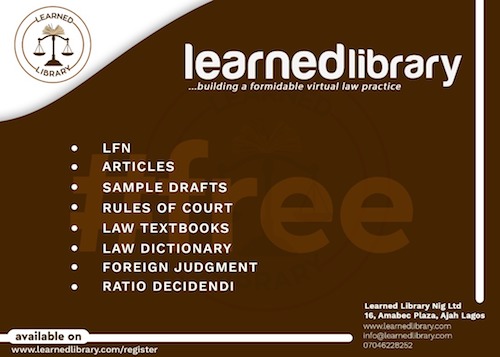By Asagunla Anjolaoluwa
INTRODUCTION
Beyond musical history or cultural memory, this debate raises important questions about identity, ownership, and intellectual property rights in Nigeria’s entertainment industry. In law, a name is not just a creative expression. It can be a trademark, capable of defining commercial value and legal ownership. And here’s the twist: even if a name is registered, the right to it can still be lost through non-use.
WHEN A NAME BECOMES A LEGAL QUESTION
A single name,” Ejanla” has reawakened a long-standing debate in the Nigerian music scene.
When Adekunle Gold released his album Fuji on October 3, 2025, the moniker “Ejanla” appeared again, instantly reminding fans of D’banj’s Mo’Hits era.
Almost immediately, the question arose:
Can Adekunle Gold legally use the same title that many associate with D’banj? Is it a case of creative inspiration, or could it border on infringement? Behind the social media discussions lies a more serious legal inquiry, Who truly owns “Ejanla”?
In Nigeria’s music ecosystem, identifiers such as stage names, slogans, and nicknames are not mere labels; they are integral to the artist’s identity. They are branding tools that carry significant commercial and cultural weight. Determining ownership is not just about who used it first, but who can legally claim, protect, and sustain it.
STAGE NAMES AS INTELLECTUAL PROPERTY
In the entertainment world, stage names and catchphrases are powerful identifiers. They help an artist build a personal brand, maintain fan recognition, and attract commercial deals for endorsements, merchandise, and collaborations.
Names like (Wizkid), (Davido), and (Burna Boy) have become deeply tied to the public identity of the artists who use them. Under Nigerian law, such names can be protected as trademarks, giving the artist exclusive rights to use them and prevent others from exploiting their identity for profit or publicity.
A strong example of this is Davido, who in 2007 filed to register “DaVido” as a word mark.
This registration gave him exclusive rights to use the name “Davido” in connection with a wide range of entertainment-related services, including:
• Conducting entertainment exhibitions like singing;
• Live performances by a singer or musical band;
• Visual and audio performances, musical, variety, news, and comedy shows;
• Personal appearances by a singer; and
• Live music concerts.
Through this step, Davido effectively established his name as a legal brand, ensuring that no one else could use or profit from it in connection with similar entertainment activities. His action remains one of the clearest demonstrations of how artists can secure their creative identities through the law.
Understanding Trademark Protection
A trademark is any name, logo, phrase, or symbol that distinguishes the goods or services of one person or business from another.
According to section 9,11,13 of the Nigerian Trademarks Act 1965, a valid trademark must meet three major requirements:
1. Distinctiveness – it must clearly identify the source of goods or services.
2. Non-deceptive and non-scandalous – it cannot mislead the public or violate public morals.
3. Originality – it must not be identical or confusingly similar to an already registered mark.
Once registered, a trademark grants the owner exclusive legal rights to use, license, or sell it. It becomes a legal asset that can be defended against unauthorized use or imitation.
IS “EJANLA” A REGISTERED TRADEMARK?
At present, there is no public record or verifiable evidence showing that “Ejanla” has been registered as a trademark by either D’banj or Adekunle Gold in Nigeria.
This means the name currently enjoys no statutory protection under Nigerian law.
Any claim of ownership would rely on common law rights. Specifically, proof of prior use and public recognition (goodwill).
However, enforcing such claims without formal registration is difficult. The claimant must show consistent and exclusive use of the name and prove that the public directly associates it with them.
Even if D’banj had registered “Ejanla” in the past, he could still lose protection through non-use.
LOSS OF RIGHT THROUGH NON-USE
Under Section 31(1) of the Nigerian Trademarks Act (1965), a registered trademark can be revoked if:
• It has not been used for five consecutive years, or
• It was registered without any genuine intention to use it.
This provision discourages people from registering names merely to block others.
Practically, this means that even if D’banj once registered “Ejanla” but later stopped using it, his rights could lapse. Opening the door for another artist, like Adekunle Gold, to claim or register it.
Exceptions to Revocation for Non-Use
There are a few exceptions under the law that can protect a trademark owner from revocation:
• Bona fide use: The mark was genuinely used within the relevant period.
• Special circumstances: Non-use was caused by reasons beyond the owner’s control, such as regulatory restrictions.
• Well-known marks: Highly recognized brands or names enjoy additional protection even without continuous use.
• Fulfilment of conditions: If the trademark owner met all registration requirements or conditions, that compliance can serve as a defense.
These safeguards prevent legitimate brand owners from losing their rights unfairly.
WHY REGISTRATION AND USE MUST GO TOGETHER
Trademark protection works best when registration and consistent use operate side by side.
• Registration without use exposes the name to revocation.
• Use without registration leaves the name vulnerable to future claims.
For artists, the ideal protection strategy is simple:
1. Register the stage name or slogan with the Nigerian Trademarks Registry.
2. Use it consistently in their branding, performances, and promotions.
That balance ensures that the name remains both legally enforceable and commercially valuable.
Conclusion
The “Ejanla” debate highlights an important lesson for Nigeria’s creative industry: fame alone does not secure ownership. Stage names and creative identifiers are powerful assets, but without formal registration and active use, they remain open to dispute.
In essence, whoever takes the legal step first and continues to use it, becomes the rightful “Big Fish.” Creativity builds recognition, but the law secures ownership.
In entertainment, your name might make you famous, but only the law can make it truly yours.
References
• Nigerian Trademarks Act, 1965
• Mondaq: Requirements and Procedure for Registration of Trademarks in Nigeria
• Procedure for Revocation of Trademark in Nigeria


